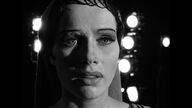This psychological battle between the actress (who is also the patient) and the female nurse constantly competes for the subjectivity of the relationship between the self and others. It can be described as a vivid interpretation of Sartre's "others are hell". At the same time, the silent mask blocks the "gazing" of the nurse. On the one hand, the nurse has to take care of the patient and needs to take the patient as the object of control. The sincerity is because she thought she could treat the actor as a patient, but when the nurse found out that she was actually being treated as a psychological research object by the actor, the actor did not really control herself, so there was an extreme act of revenge with glass, which appears here The scene of melting the film heralded the beginning of the nurse’s personality split. After that, the nurse kept repeating the relationship between control and obedience, and there was obviously a mental problem, and the actor relied on the instinct of professional identity to empathize, that is, he needed to turn the object into a The ego, has been controlling the nurse, her mockery and "don't" are very effective means. In the most important scene of the film, the faces of the two are united, showing that the actor completely controls the nurse, and the nurse becomes an actor. If you understand it according to the compensation principle that dreams are reality, the dream of the nurse at the end (the actor completely As the patient obeys the nurse), the above point is probably proved. By turning the object into the object of the self, through the words of the nurse, the evil secret in the heart (wanting his own child to die) is opened, and the actor completes the self-subject-object. The reconciliation of the actor, the last shot of the actor, seems to indicate her return to the stage, but the actor is still an object, watched by the camera. The above interpretations are inevitably subjective and biased. There should be other psychological, psychoanalytic and even philosophical interpretations in this film, or they can completely abandon interpretation and get lost in the pioneering and mysterious aspects of the film. This modernity requires the active participation of the audience. Probably the real reason this movie is already the best of Bergman's life.
View more about Persona reviews










